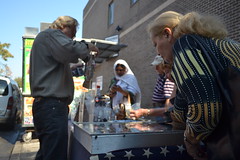A new breed of illegal vendors is hitting the streets of Brighton Beach. In the wake of a long wait to get vending licenses in New York City, some military Veterans are taking advantage of a special program that gives them licenses and they are illegally renting them to hopeful vendors. Day after day, this black market is causing a commotion on the blocks of Brighton Beach Avenue.
The process to obtain a general street vendor license in New York City is nearly impossible. In 1979, the City Council created a cap of 853 general vendors. The current waitlist is 25 years long and was closed to new applicants in 1992.
Veterans are the exception to the rule. There is no limit on how many veteran vending licenses can be distributed in New York. Disabled veterans are entitled to the additional benefit of selling on the otherwise restricted main streets, which includes Brighton Beach Avenue.
“It’s good for the veterans,” says James Williams, a board member of the Street Vendor Project and also a Veteran street vendor himself. “These people served our country and now they are able to operate their own small business in this economy. And some disabled veterans can’t or don’t want to work for private companies, so this is a great opportunity for them.”
While the special licenses are enabling many veterans the opportunity to make a living, not all vendors are playing by the rules. Because of the long wait for licenses, a black market industry has developed. Some Veterans are taking advantage of their access to legally obtaining a license and renting those licenses to desperate vendors, according to legal street vendors.
“In America, you can sell anything you want,” says Steve Olijnick, a veteran vendor who sells an array of collectibles near Brighton Beach Avenue, but who does not rent his coveted license. “I see veterans who every day sell their licenses.”
The law is clear. Vending licenses “shall not be loaned, leased, subcontracted or otherwise transferred”.
Veterans renting their licenses along Brighton Beach Avenue, a major shopping strip for locals and tourists, can take in around $100 each day, according to vendors on the strip. That’s a significant profit since the cost of obtaining a veteran vending license is only about $250 per year.
“They’re always out here,” says Yelena Makhnin, the Executive Director of the Brighton Beach Business Improvement District, referring to both the illegal vendors renting licenses from veterans and the legal vendors who constantly violate city laws. The vendors in Brighton Beach spend around ten hours a day, seven days a week, selling everything from New York souvenirs to discounted books, shirts and fruits. “It’s not fair.”
Makhnin unofficially patrols Brighton Beach Avenue every Friday looking for violators. In order to represent the businesses in Brighton, who view vendors as competition, Makhnin has familiarized herself with the violations vendors commonly exhibit. Less than five minutes into her walk one Friday, Makhnin spots a vendor violating four laws, including the use of a street sign and close proximity to the street corner. Makhnin is constantly faced with the same individuals who ignore city vending rules.
In June, the U.S. Senate passed a bill to cut down on illegal vendors nationwide, calling those who wrongfully use veteran licenses “guilty of a shameful, deceitful, and very harmful crime.” Impersonating a veteran vendor in New York City is a class A misdemeanor, which can result in up to one year in jail.
“The vendors know they aren’t allowed to do that,” says Olijnick. “And the police roust them sometimes, but they don’t really bother the vendors.”
Police officers in the 60th Precinct who patrol the Brighton Beach area, say they issue at least one ticket each day to vendors who are violating city laws. According to the precinct, however, enforcing these laws is not a top priority.
“More needs to be done,” says Makhnin.
On her most recent walk along the avenue, Makhnin approaches an older man whom she knows is renting his stand from a disabled veteran. “There are too many of you,” Makhnin tells him, sounding defeated by this reoccurring conversation.
“It’s hard to deal with people and venders in Brighton,” says Makhnin. “It’s emotionally hard, and they’re not changing.”

